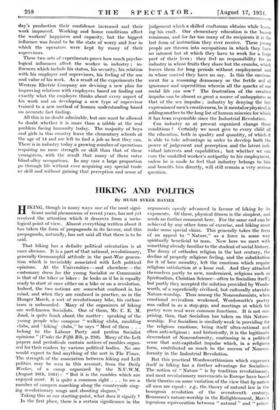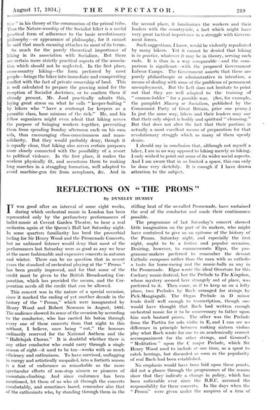HIKING AND POLITICS
By HUGH SYKES DAVIES
HIKING, though in many ways one of the most signi- ficant social phenomena of recent years, has not yet received the attention which it deserves from a socio- logical point of view. Almost everything written about it has taken the form of propaganda in its favour, and this propaganda, naturally, has not said all that there is to be said.
That hiking has a definite political orientation is at once obvious. It is a part of that rational, revolutionary, generally Germanophil attitude in the post-War genera- tion which is invariably associated with Left political opinions. At the Universities — and elsewhere —the customary dress for the young Socialist or Communist is that of the hiker or biker : he looks as if he is equally ready to start at once either on a hike or on a revolution. Indeed, the two notions are somewhat confused in his mind, and when they are confused in practice, as in the Hunger March, a sort of revolutionary hike, his enthus- iasm is unbounded. Many of the organizers of hiking are well-known Socialists. One of them, Mr. C. E. M. Joad, is quite frank about the matter : speaking of the young people who compose "walking clubs, rambling clubs, and 'hiking' clubs," he says "Most of them . . . belong to the Labour Party and profess Socialist opinions " (Under the Fifth Rib, p. 210). Many of the Left papers and periodicals contain notices of rambles organ- zed for their readers by various political bodies. No one would expect to find anything of the sort in The Times. The strength of the association between hiking and Left politics may be seen in this account, from the Daily Worker, of a camp organized by the N.U.W.M. (August 10th, 1934) : "But it is the rambles which are enjoyed most. It is quite a common sight . . . to see a number of campers marching along the countryside sing- ing revolutionary songs and shouting slogans."
Taking this as our starting-point, what does it signify ? In the first place, there is a certain significance in the arguments openly advanced in favour of hiking by its exponents. Of these, physical fitness is the simplest, and needs no further comment here. For the same end can be achieved by any other form of exercise, and hiking must make some special claim. This generally takes the form of an appeal to "Nature," as a force in some way spiritually beneficial to man. Now here we meet with something already familiar to the student of social history. The decay of orthodox religion in the last century, the decline of properly religious feeling, and the substitution for it of bare morality, left the emotions which require religious satisfaction at a loose end. And they attached themselves partly to new, modernized, religions such as Spiritualism, Christian Science—often to Socialism itself; but partly they accepted the solution provided by Words- worth, of a superficially civilized, but culturally atavistic Nature-worship. Thus among the Nonconformists, when emotional revivalism weakened, Wordsworth's poetry was called in as a stop-gap, and meetings at which his poetry were read were common functions. It is not sur- prising, then, that Socialism has taken on this Nature- worship. For Socialism is similarly weak in providing for the religious emotions, being itself ultra-rational and often anti-religious ; and historically, it is the legitimate descendant of Nonconformity, continuing in a political sense that anti-capitalist impulse which, in a religious form, contributed so much to the success of Noncon- formity in the Industrial Revolution.
But this practical Wordsworthianism which expresses itself in hiking has a further advantage for Socialism. The notion of " Nature " is by tradition revolutionary, and most revolutionary movements in Europe have based their theories on some variation of the view that by nature all men are equal : e.g., the theory of natural law in the bourgeois revolution of the seventeenth century, Rousseau's nature-worship in the Enlightenment, Marx's ingenious equivocation between " natural " and " prirni- tive " in his theory of the communism of the primal tribe. Thus the Nature-worship of the Socialist hiker is a useful practical form of _adherence to the basic revolutionary philosophy—or appearance of philosophy, for it cannot be said that much meaning attaches to most of its terms.
So much for the purely theoretical importance of biking in its association with Socialism. But there are certain more strictly practical aspects of the associa- tion which should not be neglected. In the first place, cross-country hiking—the form preferred by most people—brings the hiker into immediate and exasperating conflict with the fact of private ownership of land. This is well calculated to prepare the growing mind for the reception of Socialist doctrines, or to confirm them if already present. Mr. Joad practically admits this, laying great stress on what he calls " keeper-baiting " by hikers who "have a contempt for keepers as a parasitic class, base minions of the rich." He, and his fellow organizers might even admit that hiking serves the purpose of bringing workers together, preventing them from spending Sunday afternoon each on his own sofa, thus encouraging class-consciousness and mass- solidarity. But they would probably deny, though it is equally clear, that hiking also serves certain purposes more closely connected with the possibility of a resort to political violence. In the first place, it makes the workers physically fit, and accustoms them to making long marches in a straggling formation, well adapted to avoid machine-gun fire from aeroplanes, &c. And in the second place, it familiarizes the workers and their leaders with the countryside, a fact which might have very great tactical importance in a struggle with Govern- ment forces.
Such suggestions, I know, would be violently repudiated by many hikers. Yet it cannot be denied that hiking is in practice, whatever it may be in theory, serving such ends. It is thus in a way comparable—and the com- parison is significant—with the proposed Government Labour Camps. The Government asserts that these are purely philanthropic or administrative in intention, a means of dealing with some of the problems of permanent unemployment, But the Left does not hesitate to point out that they are well adapted to the training of " cannon-fodder " for a possible war. (See, for example, the pamphlet Slavery or Socialism, published by the Communist Party of Great Britain, price one penny.) In just the same way, hikers and their leaders may say that their only object is bodily and spiritual "cleansing." But that does not alter the fact that their pastimes actually a most excellent means of preparation for that revolutionary struggle which so many of them openly desire.
I should say in conclusion that, although not myself a hiker, I am in no way opposed to hiking merely as hiking. I only wished to point out some of its wider social aspects. And I am aware that in so limited a space, this can only be done very sketchily. It is enough if I have drawn attention to the subject.



































 Previous page
Previous page